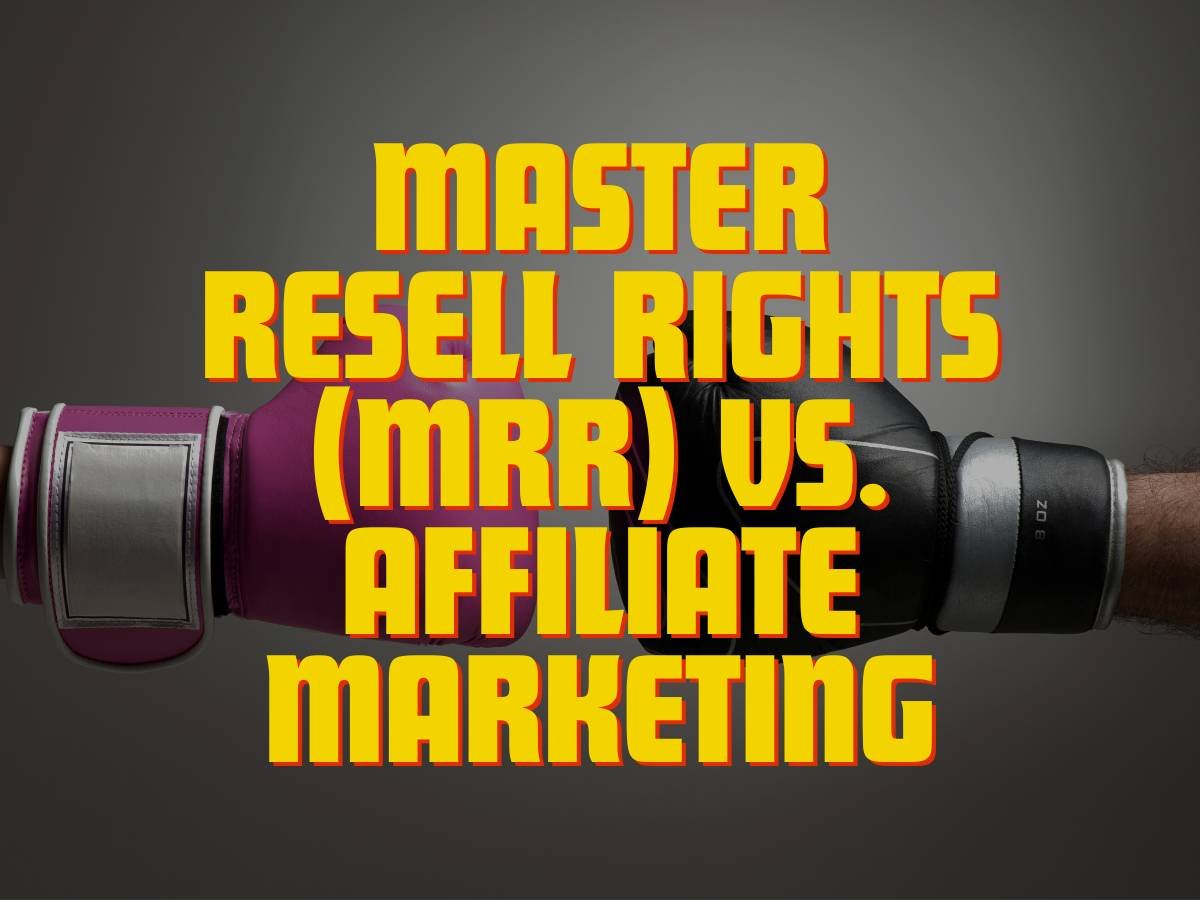Master Resell Rights vs Affiliate Marketing

the e-commerce world can be an exciting yet daunting prospect. Among the many choices you’ll face is selecting the right business model. Two popular options – Master Resell Rights (MRR) and Affiliate Marketing – offer distinct advantages and considerations.
Let’s delve into the nitty-gritty in the battle between Master Resell Rights Vs Affiliate Marketing, to help you pick the one that best suits your goals.

Understanding Master Resell Rights (MRR)
Imagine owning a digital store filled with products you can brand and sell as your own. That’s the essence of MRR. You purchase the rights to resell a digital product, like an ebook, software, or video course. Here’s a breakdown of the key points:
- Investment: MRR involves an upfront cost to acquire the resell rights. Prices vary depending on the product’s value and creator.
- Profit Potential: You keep 100% of the profits from each sale. This allows for potentially higher profit margins compared to affiliate marketing commissions.
- Control: You have complete control over pricing, branding, marketing strategies, and customer service.
- Product Quality: The success of your sales hinges on the quality of the product you acquire. Choosing reputable vendors with well-made products is crucial.
- Marketing Responsibility: You’re solely responsible for driving traffic and generating sales for your chosen product(s).
Pros of Master Resell Rights (MRR):
- Higher Profit Potential: Keeping 100% of the profits can be a significant advantage, especially for high-ticket digital products.
- Brand Building: You can build your own brand and reputation around the product, fostering customer loyalty.
- Flexibility: You have complete control over pricing, marketing, and customer service, allowing you to tailor strategies to your audience.
Cons of Master Resell Rights (MRR):
- Investment Risk: Upfront costs for acquiring the rights can be a barrier for some.
- Marketing Burden: You shoulder the entire marketing responsibility, requiring significant effort and resources.
- Product Dependence: Your success is tied to the product’s quality and market demand.

Affiliate Marketing Explained
In affiliate marketing, you act as a brand ambassador, promoting another company’s products and earning a commission for every sale generated through your unique referral link. Here’s a closer look:
- Investment: There’s typically no upfront cost to become an affiliate marketer.
- Profit Potential: Your earnings depend on the commission rate offered by the company and the sales volume you drive.
- Control: You have limited control over the product itself, but you can influence how you promote it to your audience.
- Product Quality: Your success is partially dependent on the reputation and quality of the products you promote.
- Marketing Responsibility: While you’re responsible for driving traffic and sales, the company handles product creation and customer service.
Pros of Affiliate Marketing:
- Low Barrier to Entry: There’s minimal financial risk involved, making it an accessible option for beginners.
- Wider Product Choice: You can promote an array of products, catering to diverse audience needs and interests.
- Scalability: You can readily expand your affiliate portfolio to increase income potential.
Cons of Affiliate Marketing:
- Lower Profit Potential: Commissions can be lower compared to the potential profits with MRR.
- Limited Control: You have less control over pricing, branding, and customer service.
- Reliance on Third Party: Your income can be impacted by changes in the company’s commission rates or product quality.
Choosing the Right Path: Master Resell Rights Vs Affiliate Marketing
The ideal choice when it comes to Affiliate Marketing Vs Master Resell Rights depends on your resources, goals, and risk tolerance. Here’s a quick comparison to guide your decision:
Choose MRR if:
- You have the budget to invest in acquiring resell rights.
- You prefer complete control over branding, marketing, and pricing.
- You aim to build your own brand and customer base around a curated product selection.
Choose Affiliate Marketing if:
- You’re new to e-commerce and want to minimize financial risks.
- You enjoy promoting a variety of products and building relationships with different companies.
- You want to test different products and find markets that resonate with your audience.

The Hybrid Approach: Combining MRR and Affiliate Marketing
The beauty of e-commerce lies in its flexibility. You’re not restricted to a single model. In fact, combining MRR and affiliate marketing can be a powerful strategy to create a robust income stream and establish yourself as a prominent figure in your niche. Here’s how you can leverage the strengths of both approaches:
Building Trust and Authority with Affiliate Marketing:
- Start by becoming an affiliate marketer. This allows you to test the waters of e-commerce with minimal financial risk. Focus on promoting high-quality products within your chosen niche.
- Create valuable content: Educate your audience by writing blog posts, reviews, tutorials, or creating videos showcasing the benefits of the products you promote.
- Build an email list: Capture leads by offering valuable opt-in incentives like cheat sheets, ebooks, or exclusive discounts. An email list allows you to nurture relationships with potential customers and build trust.
Leveraging MRR to Elevate Your Offerings:
- Once you’ve established your expertise and audience, consider incorporating MRR products. By strategically selecting products that complement your affiliate offerings, you can provide even greater value to your audience.
- Offer MRR products that address specific pain points your audience faces. Demonstrate how these products can solve problems or enhance the results achieved through the affiliate products you promote.
- Package MRR products with your own bonuses. This could include additional training materials, templates, or cheat sheets that further enhance the value proposition for your customers.
Building a Sustainable Revenue Stream:
- With MRR, you keep 100% of the profits, offering potentially higher profit margins compared to affiliate commissions. This allows you to scale your income more effectively as you sell more of your own products.
- The combination creates a tiered sales funnel. You can offer a lower-priced affiliate product as an entry point, then upsell your higher-value MRR product to those who seek a more comprehensive solution.
- An email list becomes even more valuable. You can segment your list and send targeted promotions based on subscriber interests. Promote affiliate products to those who haven’t purchased your MRR offerings yet, and nurture existing customers with upsells and exclusive MRR product discounts.
Examples of a Hybrid Approach in Action:
- Imagine you’re an affiliate marketer promoting a weight loss program. You could create valuable content like blog posts with healthy recipes, exercise routines, and motivational tips. You could then offer an MRR product as a companion guide, containing detailed meal plans, workout calendars, and progress-tracking templates.
- An affiliate marketer promoting productivity software could offer an MRR product with customizable templates for project management, time tracking, and goal setting. This would cater to users seeking a more comprehensive organizational system.
The key to success with the hybrid approach lies in creating a cohesive ecosystem of valuable content, high-quality affiliate products, and well-crafted MRR offerings that solve real problems for your target audience.
By strategically combining these elements, you can establish yourself as a trusted authority in your niche, build a loyal customer base, and generate sustainable profits through both affiliate commissions and your own branded products.
Additional Tips for Success:
- Content is King: Regardless of the model you choose, creating high-quality and informative content is crucial. This establishes you as a thought leader in your niche and attracts potential customers.
- Building an Email List: An email list is a valuable asset, allowing you to nurture leads and promote your products or affiliate offers directly.
- Compliance: Always adhere to affiliate marketing disclosure regulations set by the FTC (Federal Trade Commission) in the US.
- Stay Updated: The e-commerce landscape is constantly evolving. Keep yourself updated on the latest trends and adapt your strategies accordingly.
Conclusion
Both MRR and affiliate marketing offer viable paths to success in the e-commerce world. By understanding the strengths and weaknesses of each model, you can make an informed decision that aligns with your goals and resources.
Remember, the most successful approach often involves a combination of strategies and continuous learning. So, equip yourself with the right knowledge, choose the path that excites you, and get ready to build your e-commerce empire!






